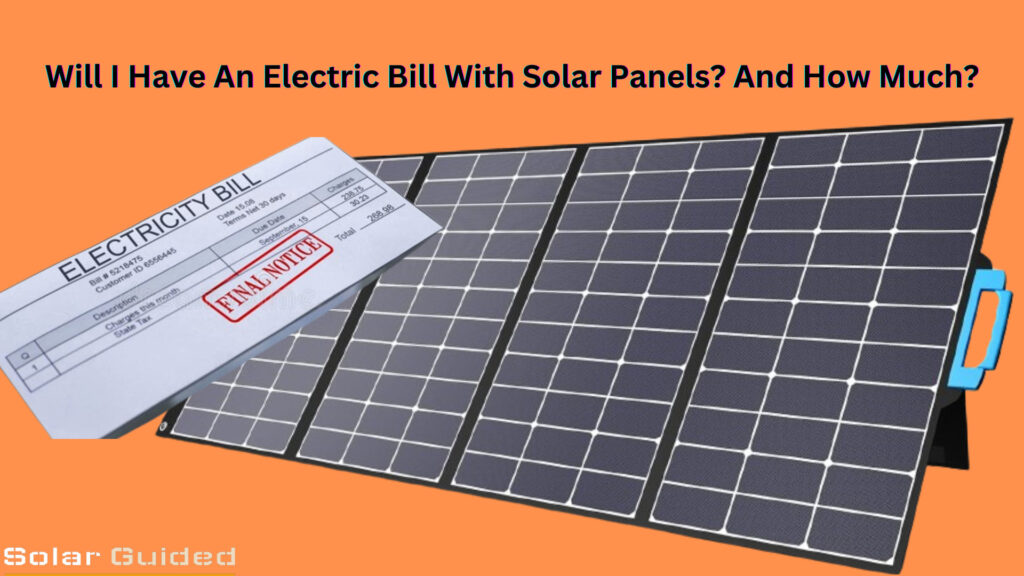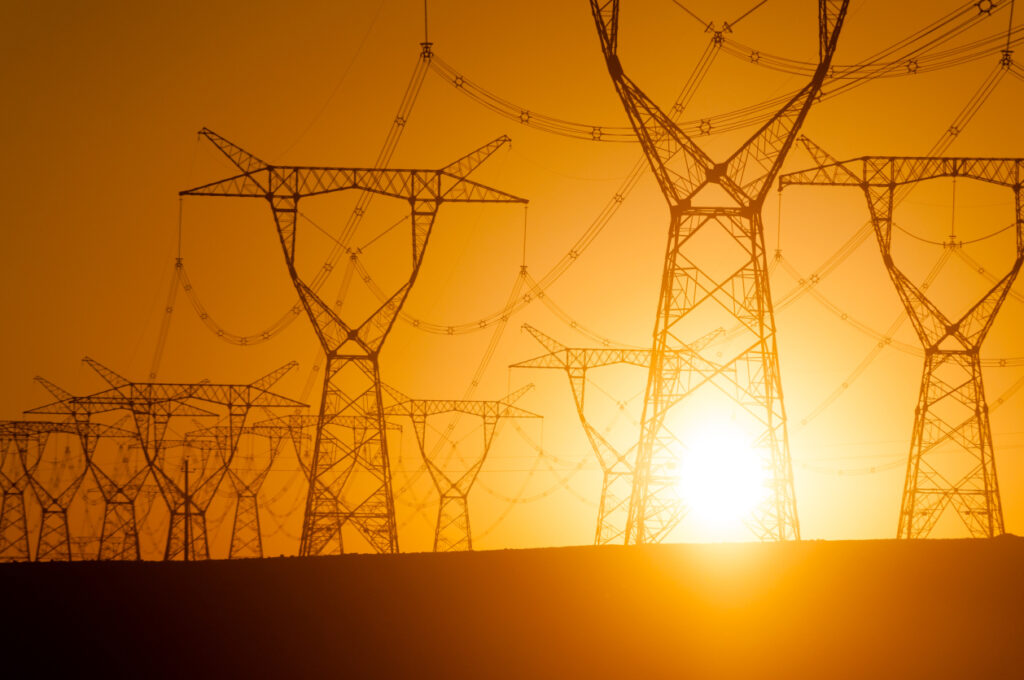
1. Will I Have An Electric Bill With Solar Panels?
Yes, you will have or receive your electricity bill every month while going solar, because going solar doesn’t mean saying goodbye to your electric bill completely. Solar panels create electricity from sunlight, but it’s not enough to cover all your needs. You’ll still get a monthly bill while they reduce your regular electricity use.
2. How do solar panels work with your electric bill?
Imagine you have solar panels on your roof, and during a sunny day, they generate enough electricity to power your home. However, your solar panels produce less or no electricity when the sun goes down or on cloudy days. At those times, you still need electricity to keep your lights on, appliances running, and devices charging.
This is where traditional electricity from the grid comes in – it fills the gap when your solar panels aren’t actively generating power. So, while solar panels help, they may not cover all your electricity needs, and that’s why you’ll still receive a monthly bill.
Method To Setup Solar Panels With Electricity:
- Install Solar Panels: Place solar panels on your roof or property to capture sunlight.
- Convert DC to AC: Solar panels generate direct current (DC), which is converted to usable alternating current (AC) by an inverter.
- Connect to Electrical Panel: Connect the inverter to your home’s electrical panel to power appliances.
- Net Metering: Excess electricity can be sent back to the grid, reducing your electric bill through net metering.
- Stay Connected to the Grid: Remain connected to the utility grid for continuous power, especially when solar production is low.
- Monitor and Save: Monitor your solar system’s performance and enjoy reduced electricity bills over time.
Step 4 Explained:
Net Metering Connection:
- Set up a net metering arrangement with your utility company.
- Excess electricity generated by your solar panels and not used immediately is sent back to the grid.
- A bidirectional meter tracks both the electricity you consume and the surplus you contribute, allowing you to earn credits.
- These credits can offset your electric bill when your solar panels produce less electricity (e.g., at night).
3. Average Monthly Electric Bill with Solar Panels
When you have solar panels, your monthly electric bill can change. On sunny days, the solar panels make electricity, and you might notice a smaller bill because you’re using solar energy to run your appliances. But when it’s not sunny or during the night, your solar panels don’t make electricity, and you’ll still need regular electricity from the power company. So, your bill might be less, but it probably won’t go away completely.
So Simply You electric bill will be reduced upto 70% by going solar:
If you were getting monthly bill of about $200/month, after going solar you can reduced that bill to $50-$60 while not reducing your daily appliances usage. Most people in United States(USA) receives a maximum up to $60 for normal a family house with solar panels installed.
4. How Do Solar Panels Lower Your Electric Bill?
When you are using solar panels at your workplace or home, during sunny days you will be using most of the energy from the sun by converting it into electrical energy using your solar panels then that DC will be converted to AC Current by using inverters.
The problem is during the night time you don’t have sun or even when it’s raining so the best solution for this is to use good power storing batteries so User can use the energy stored in their solar batteries during nights, rainy days, cloudy days, when during peak charge periods (when grid electricity rates are high), rather than buying it from the grid.
Solar panels lower your electric bills by running your home appliances like refrigerators, fans, lights, etc, and charging your devices during the daytime. In the daytime sunlight is available so solar panels convert the solar energy into electrical energy and energy is generated which is used to power your house meaning that you will not use electricity to run your home appliances during the day so this will reduce your electricity bills.
Typical monthly electricity bill with solar panels:
The typical monthly electricity bill with solar panels can vary widely, it is influenced by the following factors:
- Number Of Solar Panels
- Local sunlight conditions
- Daily Required Electricity
- Energy consumption patterns
- The cost of electricity in a specific area
1. Number Of Solar Panels:
The capacity of the solar panel system, measured in kilowatts (kW) or megawatts (MW), plays a crucial role in determining the amount of electricity generated. Larger systems generally yield more electricity and can offset a higher percentage of the monthly consumption.
2. Local Sunlight Conditions:
The efficiency of solar panels depends on the amount of sunlight they receive. Regions with more sunlight tend to generate more electricity, while areas with frequent cloud cover may experience lower energy production.
3. Daily Required Electricity:
Your monthly bill depends on the daily electricity required to run your home appliances or to power your house if more electricity is required then you will have high electricity bills.
3. How much you are Generating:
Your monthly electricity bill indirectly depends on the amount of power your solar panels are generating if your solar panels are generating more electricity it will reduce your monthly electricity bill.
5. Electricity Rates:
The cost of electricity from the grid varies by location. Areas with higher electricity rates may see more significant savings when generating their electricity with solar panels.
How does solar panel work with your local electricity:
The solar panel works with your local electricity and we still have bills but they are not very high. When there is a sunny day we use solar panels and when there is a rainy day sunlight is not available solar energy can’t be generated and batteries are low so we use electricity.
How To Earn Credits With Your Solar Panels?
1. Net Metering:

Many areas implement net metering, allowing you to receive credits for excess electricity sent back to the grid. These credits can be used when your solar panels aren’t producing enough electricity, such as at night.
2. Net Metering Policies:
The presence of net metering allows solar panel owners to receive credit for excess electricity fed back into the grid, affecting overall savings on the monthly electricity bill.
Providing a specific figure for the typical monthly electricity bill with solar panels is challenging due to this variability. Nonetheless, many solar panel owners experience substantial reductions in their bills, with some achieving near-zero balances or receiving credits during months of excess generation.
Before installing solar panels, it’s advisable to conduct a detailed analysis based on individual circumstances, considering local regulations and incentives. Consulting with solar professionals can help estimate potential savings accurately.
3. How does Net Metering Benefit The Home Owners?
Net metering is a billing arrangement and regulatory policy that allows owners of solar panels or other renewable energy systems to receive credit for the excess electricity they generate and feed back into the grid. Net Metering benefits homeowners by giving them credits for the extra electricity generated by their solar panels.
For example, if your solar panels generate 1500 watts of electricity per day and you are using or consuming only 1000 watts of electricity and for the extra 500 watts of electricity generated by the solar panels the homeowners will get credits.
- Net Metering Reduced Dependence on the Grid:
Net metering is a billing arrangement used by utilities to credit owners of solar power systems for the electricity they add to the grid. By generating your electricity, you decrease reliance on the traditional power grid. This can lead to lower electricity bills as you purchase less power from the utility company.
4. When will you get paid for the amount of credits from Net Metering?
As you know in Net Metering credit is given to the homeowner for the excess amount of electricity or solar power generated by the solar panels. This credit can be in the form of money or it can be in the form of electricity or power, the credit is given by utility companies.
When you will receive the type of credit which is in the form of electricity? You will receive that credit when there is a need for electricity in your house. For example on a sunny day, your solar panels produce electricity in an amount more than required so the excess amount of electricity is directed to the grid. On a cloudy or rainy day, when your solar panels produce little or no electricity you will receive credit means an excess amount of electricity.
When you will receive the type of credit which is in the form of electricity? You receive the credit in the form of money every month (depending on the utility company) or sometimes when you have an overage after the anniversary date the utility company will pay you for the overage but the amount is very little.
How to further reduce your electricity bills with solar panels?
We can further reduce our electricity bills with solar panels in the following ways:
- Use more solar panels.
- Ensure good position and angle for your solar panels.
- Consider using high-storage batteries so you can use that energy during the night time or on cloudy days.
- Keep them clean because dirt can affect their efficiency.
- Use your high-power usage appliances in the daytime when your solar panels are at work.
Also Read: Which Solar Panel Is Best For Mobile Homes – Expert Choice
Our Other Guides On Solar Panels You Can Read:
Also Read This Article From Us: Best Solar Panels For RVs In 2024
Also Read This Article From Us: How To Clean Your Solar Panels? Easy Method
Also Read This Article From Us: Are Solar Panels Worth It In Texas?
Also Read This Article From Us: Net Energy Metering (NEM) 3.0 In California